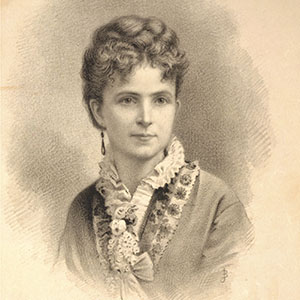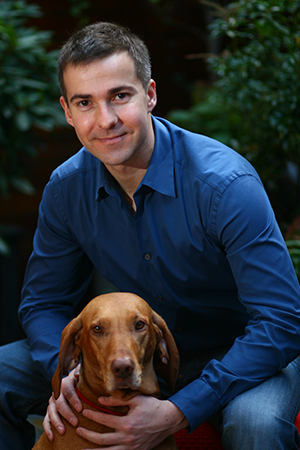Plural views
Novelist David Ebershoff investigates the sensitive subject of polygamy.
By Ruth E. Kott, AM’07
Top image courtesy the Library of Congress, LC-USZC4-6668
Bottom photo by Edie Sanchez
In a Milwaukee bookstore this summer, David Ebershoff, MBA’96, was confronted by a pro-polygamist. After Ebershoff read an excerpt from his most recent novel, The 19th Wife (Random House, 2008) the man jumped up, wagged his finger at the author, and announced, “If you believe in freedom, you have to believe in polygamy. If you don’t believe in polygamy, you don’t believe in freedom.” Then he walked out.
 Brigham Young’s 19th wife, Ann Eliza, was the inspiration for Ebershoff’s expansive novel.
Brigham Young’s 19th wife, Ann Eliza, was the inspiration for Ebershoff’s expansive novel. Ebershoff disagrees with that assessment of polygamy, a subject he explores comprehensively in The 19th Wife. But he doesn’t outright denounce the 19th-century Mormon practice. “Polygamy really presses on some core American values,” he says. “We believe in the right of religious freedom, the right to believe what we believe, the right for others to believe what they believe. But polygamy begins to press on those beliefs.” In other words, he explains, it forces Americans to reconsider the limits of their inalienable rights.
In the book, a New York Times bestseller and a Publisher’s Weekly Pick of the Week, Ebershoff weaves historical autobiographies, a contemporary genre mystery, academic papers, newspaper articles, letters, even a Wikipedia entry—all fictionalized, but based on historical events and people. “If you ask six people about polygamy, you’re going to get six different answers,” he says. “I thought fiction would accommodate these differences.”
The practice of “celestial marriage,” as Latter-day Saints founder Joseph Smith called it, was a central tenet in early Mormonism. Smith and his followers—including Brigham Young, who became the Latter-day Saints’ president and prophet after Smith’s 1844 murder—believed that acquiring multiple wives was a key to their salvation.
Young himself had an estimated 27–56 wives (the number varies depending on changing definitions of “wife” over time), including Ann Eliza (Webb) Young, who was 24 when she married the 67-year-old leader. Claiming spousal neglect and poor treatment, she left the Mormon Church in 1873, filed for divorce, and embarked on a cross-country lecture tour. She also published two memoirs before mysteriously disappearing in 1908.
Ebershoff first learned of Ann Eliza seven years ago while working as publishing director of the Modern Library, the classics imprint of Random House. Inspired by her story, he rewrote Ann Eliza’s autobiography using only her “basic biographical arc” as a guide.
This fictionalized 19th-century memoir is but a fragment of Ebershoff’s 519-page tome. Given equal time is a story of contemporary polygamy—laced within a whodunit. Although the Latter-day Saints abandoned polygamy in 1890 as a condition of Utah receiving statehood, plural marriage has continued today in splinter groups like Warren Jeffs’s Fundamentalist Church of Jesus Christ of Latter Day Saints in Hildale, UT, and Colorado City, AZ. Ebershoff’s protagonist is 20-year-old Jordan Scott, who was excommunicated from the (fictional) fundamentalist sect First Latter-day Saints of Mesadale, AZ, for holding his stepsister’s hand. Living in Los Angeles when he reads online that his father has been murdered and his mother—the 19th wife—was arrested for the crime, Jordan returns to Arizona to unravel what actually happened.
 David Ebershoff was chased out of a polygamist community while researching The 19th Wife.
David Ebershoff was chased out of a polygamist community while researching The 19th Wife. For his research, Ebershoff traveled to Hildale/Colorado City, hoping to speak with members of the polygamist community. “But that wasn’t really going to be possible once I got there,” he says. Instead, he was literally chased out of town by a police car. In The 19th Wife, Jordan has a similar encounter in Mesadale, where he is tailed by a “jacked pick-up” until he reaches the highway.
Intertwined with Ann Eliza’s and Jordan’s stories are the voices of Ann Eliza’s relatives. Her father Chauncey Webb’s memoir, for example, recounts his initial struggle with the idea of having more than one wife. The text also includes the faux academic papers of Kelly Dee, a graduate student at Brigham Young University who set out to research Ann Eliza’s life and legacy for her master’s thesis.
The 19th Wife is Ebershoff’s third novel. His 2000 book The Danish Girl, currently in production for a movie, was inspired by the life of artist Lili Elbe (born Einar Wegener), who underwent one of the first male-to-female sex-change operations in the 1930s.
“I always wanted to be a writer,” Ebershoff says. “And then I grew up, and I needed a job.” After getting turned down by several MFA programs, he decided to try his hand at publishing. While at the GSB he interned at Random House, and he sold ads and read fiction for the Chicago Review. He now works as an editor-at-large at Random House, where he edited the late Norman Mailer for the last five years of Mailer’s life. “I’ve learned a lot about editing from being a writer,” says Ebershoff, who also teaches in Columbia University’s writing program. “I’m pretty comfortable with reading something and recognizing where it needs some work.”
Editing has also helped him to become a better writer. “If the reader doesn’t turn the page, nothing else counts,” he says. “I’ve got to give a reader a reason to turn the page.”
In The 19th Wife the steady shifts among stories, voices, and points of view provide more than one reason to keep reading—and reflect Ebershoff’s multifaceted view of polygamy. “I definitely got a better sense of the complexity of the issue,” he says. “I’ve heard people say about 21st-century polygamists, ‘How can they believe that?’ As someone put it to me, if you believed that polygamy was central to your salvation…as much as you believed the sun would rise tomorrow, then you could withstand any suffering or indignities or sadness that might come from the institution in your present life.”
On the other hand, he emphasizes, the practice has widening effects: “The one thing I do know from my experience is that a lot of children are very sad in these households.”
Like many of his characters in the novel, he does not have a final opinion on the subject. “It’s nearly impossible to come to a conclusion on polygamy,” he says. “It hasn’t concluded in American history, and it’s not about to soon.”